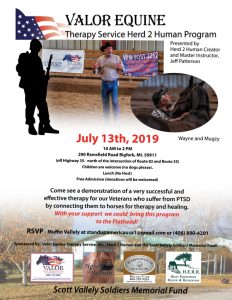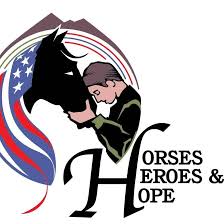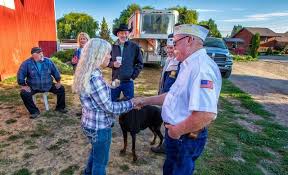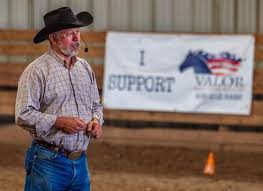November 14, 2018 at 5:00 am | By KIANNA GARDNER Daily Inter Lake
For more than five years, Valor Equine Therapy Service Inc., a nonprofit based in Columbia Falls, has used the healing power of horses to help active duty members, veterans and first-responders manage and mitigate the side effects of post traumatic stress disorder (PTSD), a condition that occurs when someone struggles to recover mentally from a traumatic experience.
Some estimate more 13 million people in the United States struggle with PTSD and among the most susceptible are veterans and first-responders.
The U.S. Department of Veterans Affairs estimates that PTSD affects about 30 percent of Vietnam veterans during their lifetimes, about 12 percent from the Gulf War and about 15 percent from operations in Iraq.
Valor’s founder, Lynn Murray, said that although she is not a veteran herself, her countless friends who served in Desert Storm and Vietnam inspired her to start the organization.
“I wanted to try and help my friends who seemed to not be receiving any help from the VA,” Murray said. “I noticed other animals like dogs were being used to heal people so I thought, why not horses?”
Those who choose to go through Valor’s program participate in various “talking circles” with mental-health professionals and are individually paired with a horse to interact with and care for alongside staff. Considering experiences with PTSD are often difficult to discuss openly, groups usually don’t consist of more than six participants at a time, Murray said.
To describe the benefits of human and horse interaction, Jeff Patterson, co-founder of Herd 2 Human, often turns to a tried-and-true Winston Churchill adage: “There is something about the outside of a horse that is good for the inside of a man.”
According to Patterson, interacting with horses can lower blood pressure and slow heart rates. Horses also read and often mirror the emotions and behaviors of their owners and caretakers.
Common side-effects of PTSD include bouts of anxiety and mood swings — emotions that, should they arise, are difficult for those who are suffering to notice. So when the horse begins mirroring their behaviors, participants are then able to recognize and monitor their side-effects, said Valor’s operations manager, Wayne Appl.
“Horses are like a 1,200-pound lie detector,” Appl said. “You can’t hide anything from them.”
And program participants are not the only ones to benefit from equine therapy.
Some of the horses used in Valor’s program are rescues brought in from the Hiatt Equestrian Rescue and Recreation center in Bigfork. The horses are sometimes saved from slaughterhouses and abusive living conditions and are fighting mental problems of their own.
“Those horses need human touch as much as the humans need to touch them,” Murray said. “The animals sometimes finish the program just as healed as the people are.”
Murray said Valor has grown significantly over the years and she hopes to expand their facilities soon. In February, Skijor USA is coming to Columbia Falls and will donate a portion of proceeds from the event to Valor.
Reporter Kianna Gardner may be reached at 758-4439 or kgardner@dailyinterlake.com.






